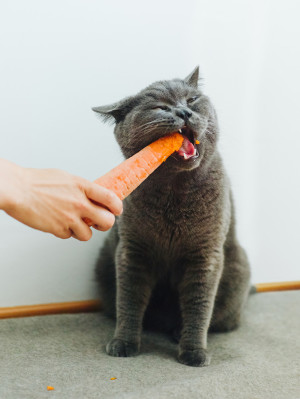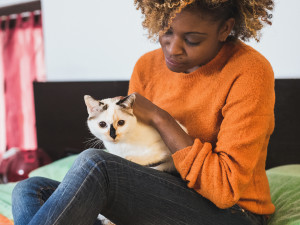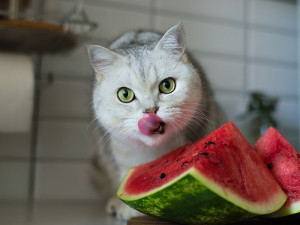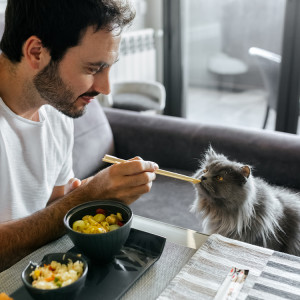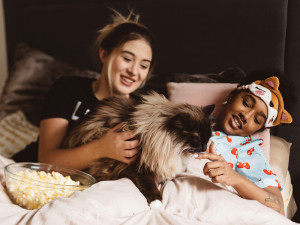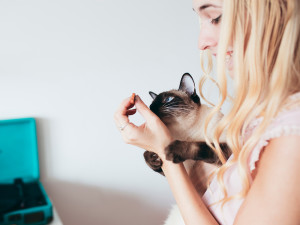You Should Not Invite Your Cat to Your Fondue Party
Save the charcuterie board for the humans
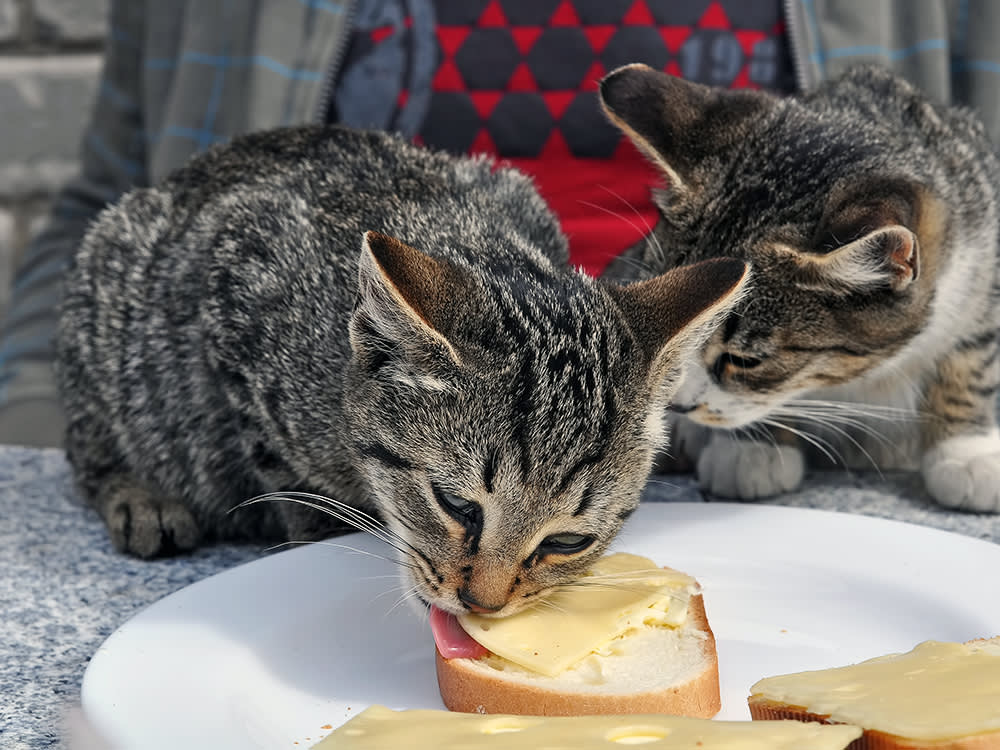
share article
Cheese is one of the best things about life. It pairs excellently with wine; it transforms a bowl of plain tortilla chips into delicious nachos; and it’s something interesting to add to something less appealing (lookin’ at you, cauliflower). It even comes in non-dairy forms for those of us afflicted with lactose intolerance. But when your cat is literally sniffing around your charcuterie board, think twice before breaking out the brie.
While some cheeses – hello, cheddar – are safe for cats in moderation, others could cause health issues including serious tummy troubles. Sharing an occasional bite of Swiss cheese from your sandwich or tucking a pill into a cube of cheddar is probably not a big deal, but you should never let your cat devour the leftovers from a cheese and wine night.
Why shouldn’t cats eat cheese?
“Some cats seem to tolerate more lactose in the diet than other cats,” says Dr Maryanne Murphy, a clinical assistant professor of nutrition. “It is OK to give most cats a small volume of dairyopens in a new tab products like cheese, but sticking to a small amount is best because a higher quantity is more likely to risk negative gastrointestinal effects.”
Cats are obligate carnivores who need protein for optimal health. Cheese might be high in protein – an ounce of cheddar contains seven grams – but cheese and other dairy products weren’t meant to be the main source of protein in the feline food plan. Dr Murphy notes that cats lack lactase, the enzyme needed to break down lactose in dairy products, making it hard for them to digest the delicious muenster or gouda. That’s why eating cheese can cause them to experience symptoms like wind, diarrhoeaopens in a new tab and vomitingopens in a new tab.
Cheese and other products containing lactose could also interfere with your cat’s ability to digest protein. Plus, cheese is high in fat, which could cause your feline friend to pack on the pounds, increasing their risk of diabetes, pancreatitis liver disease and arthritisopens in a new tab.
Are certain cheeses safer than others?
Swiss and cheddar cheese are lower in lactose than other cheese, which makes them the safest options for cats. Skip the soft cheeses, such as mozzarella, cottage cheese and cream cheese, which contain higher levels of lactose. There’s an extensive ‘no’ list when it comes to cats and cheese.
Never offer brie and camembert or other cheeses made with raw milk because it increases the risk of pathogens including salmonella and listeria. Blue cheese contains mould, which can be toxic to cats. Non-dairy cheeses may not contain the lactose that causes tummy upset but vegan cheese are still high in fat and salt, which are not a part of a healthy diet for cats.
How to add cheese to your cat’s diet
A few bites of cheese isn’t cause for alarm, but call your vet if your cat devours a cheese pizza or noshes on any cheeses on the ‘no’ list.
The bottom line: can cats eat human food?
When it comes to sharing your food with your cat, it’s always important to double-check that what you are offering is safe for your feline friend. There are some foods that are OK in moderation, but there are also some foods we eat all the time that are surprisingly toxicopens in a new tab to cats.
If in doubt, consult your vet before offering your cat something new. Always make sure that what you offer is free of spices and oils that could be problematic for your cat, even if the main ingredient is safe.
Be sure to avoid foods that may be a choking hazard or cause injuries to your cat’s digestive tract, such as foods with bones, shells, toothpicks or skewers. And finally, remember that cats have very unique nutritional requirements so they must get the bulk of their diet from a balanced cat food diet. The occasional scrap of human food may be a delicious treat, as long as it is less than 10 percent of your cat’s total diet. Most important of all, be sure to provide your kitty with appropriate, nutritionally balanced cat food.
Foods that are good for cats
If you are looking for healthy snack options to share with your cat, consider some of these:
Watermelon can be a refreshing treatopens in a new tab to share with your kitty.
Peanut butteropens in a new tab is high in protein and good fats.
Apples are a great source of fibreopens in a new tab and many important vitamins (although the seeds can be toxic ingested in large quantities).
Foods that are dangerous to cats
Garlic is toxic to cats and can cause life-threatening anaemia.
Onions are toxic to cats and can cause fatal health complications.
Chocolateopens in a new tab is toxic to cats and can cause a range of health problems depending on how much is ingested.
Note: while caution was taken to give safe recommendations and accurate instructions in this article, it is impossible to predict an individual cat’s reaction to any food or ingredient. Readers should consult their vets and use personal judgement when applying this information to their own cats’ diets.

Jodi Helmer
Jodi Helmer is a North Carolina-based freelance writer who shares her home with an embarrassing number of rescue dogs and relies on four feral cats to patrol the barn. When she isn’t refilling food and water dishes, Jodi writes about animals for Scientific American, Sierra, WebMD, AKC Family Dog, Living the Country Life, and Out Here.
Related articles
![White kitten with tongue out next to slices of watermelon]() opens in a new tab
opens in a new tabCan My Cat Safely Enjoy Watermelon?
Yes, the summertime staple is on the list of safe foods for cats
- opens in a new tab
Can Cats Eat Carrots?
Learn whether your little Bugs Bunny can crunch on the veggie
![Man feeding rice to cat with chopsticks at dinner table]() opens in a new tab
opens in a new tabCan Cats Eat Rice?
A warm bowl of rice is your cat’s version of comfort food
- opens in a new tab
Can Cats Eat Popcorn?
They want to enjoy movie night, too, you know
![Blonde woman holding cat trying to feed it ham]() opens in a new tab
opens in a new tabCan Cats Eat Ham?
Ham is OK – with a couple of caveats
